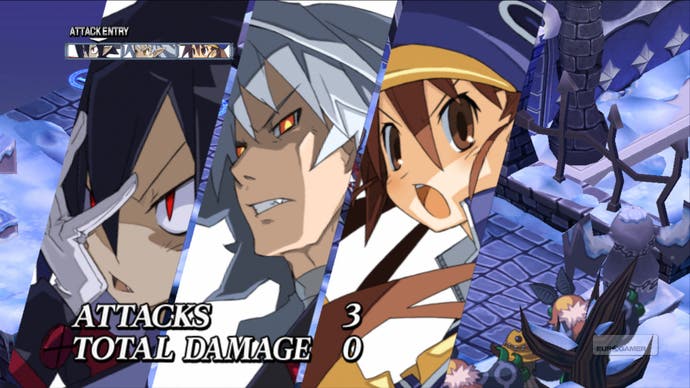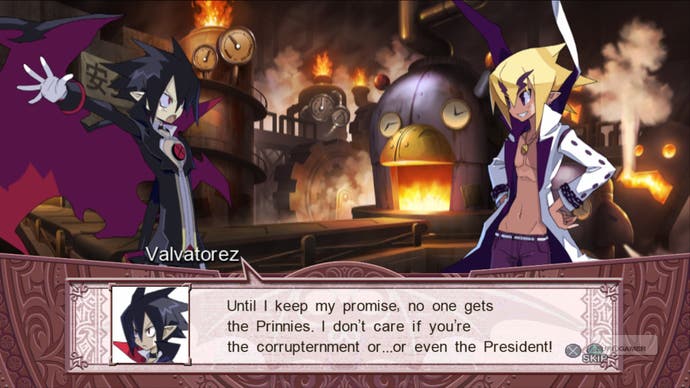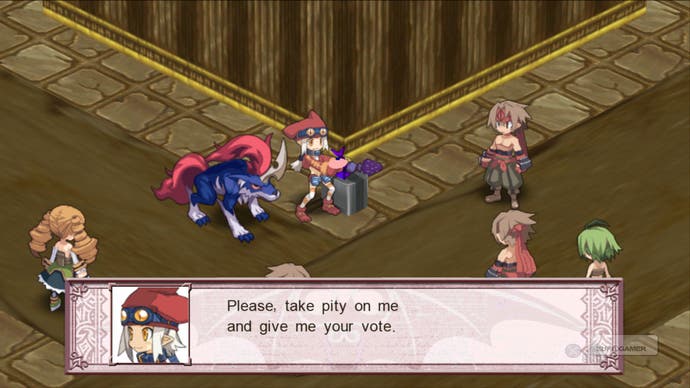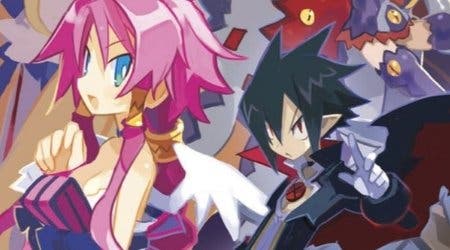Disgaea 4 Review
The toy that never grew up.
Disgaea is about the obsession of two groups of people: Nippon Ichi's obsession with breaking the limits of the strategy RPG, and an audience equally obsessed with doing so. Role-playing shouldn't even be part of the description, really, unless you consider a detached observer of electronic numbers a role. The scientist prodding the rats, perhaps: the man who sends armies to the Item World.
Since its PS2 debut in 2003, Disgaea has changed little: its acolytes argue over the iterations, but no entry has truly diverged from the original's formula. Disgaea 4 is a little more but no less than expected: a new entry that (finally) gives an HD spruce to its gorgeous sprites, adds a dusting of online integration, and serves up the same experience. If it ain't broke, just fiddle with it.
This means that Disgaea 4 is more bewildering than ever for newcomers, and far too many of Disgaea's weird rules are left unexplained. It expects too much familiarity. The senate house is barely introduced, despite being key for upgrading shop items and creating new characters, and that attitude runs through the game: here we go again, and if you haven't played Disgaea before then tough luck, dood.
Which is hard to get too angry about, because let's face it: if you haven't played a Disgaea before then the fourth entry wasn't going to be the tipping point. If you have, Disgaea 4 is better-looking and still has everything you enjoyed grinding through so much. Everything that matters in Disgaea can be grinded - so the only real, lasting rule of playing Disgaea is simple: grind ALL the things.

To describe it as maths is somewhat over-complicating matters: this is about numbers going one way only, and it certainly isn't down. Any RPG, nevermind a strategy RPG, always boils down to killing things over and over to make a set of stats get bigger and bigger, and Disgaea's hook is in making that the front-and-centre star attraction rather than hiding it in the basement.
Everything is done through battles, which can be accessed in one of several ways but have common rules: you have up to ten fighters that can be spawned from a single point onto isometric maps, terrain that can range from simple shapes to bewildering Escher-like contraptions. Enemies are knocking about, some immediately hostile and some dormant until triggered, and on most levels parts of the surface will be coated in a primary colour.
These are geo-panels, and though I could send you to sleep expounding on their effects and interaction with geo blocks, suffice to say that colour-matching them in certain combinations is the goal. You tend to do this by tossing blocks into one another, or onto the right colour of panel, and throwing in itself is a Disgaea signature.
The game divides characters into Human types and Monster types, and Human types can throw allies, enemies, blocks and certain bits of scenery. It's not the kind of ability you use all the time, but it's there in a pinch - if your main man is suddenly isolated in a bad spot, a loose chain of troops can yank him out. Similarly, if you've absolutely just got to kill an infuriating enemy first, immediately renditioning it into a dark corner with a few good ol' boys seems to get results.
Story mode is the first port of call, and Valvatorez is the most memorable protagonist the series has had since the original's Laharl. A grandiose vampire sworn off blood and dedicated to sideways leaps of principle, his quest to save the Prinnies from extermination takes Disgaea 4 to the moon and back - before the customary endgame switches in characters old and new to play out events differently.

The script is self-referential and bitingly funny at times, swinging all the way from Obama to the folly and wickedness of war, but despite the great lines it's not what you'd call an emotional journey: when the central topic is sardines and Prinnies there's only so much you can do. There's an awful lot to learn about sardines, it turns out, and Disgaea 4 is crammed with the facts - by the end I felt a certain apathy towards oily fish, though you have to respect how doggedly far it takes one comedy prop.
Everything's accessed from a compact hub with plenty of familiar features and a few new ones - prime among which is the Cam-Pain HQ. As well as showcasing Disgaea's love of puns, another obsession, the Cam-Pain HQ succeeds Disgaea 3's confusing classroom, and is a much clearer way to adjust and boost your team. A map of conquered areas is divided up into chunks and, by placing team members and various special landmarks on adjacent squares, you can set up certain buffs or special rules - sharing experience between low-level and high-level characters, for example, or boosting the currency gained from kills.
"The Cam-Pain HQ succeeds Disgaea 3's confusing classroom, and is a much clearer way to adjust and boost your team."
An online map editor is unlocked after the third chapter of Story Mode and, while it's not going to be giving Media Molecule sleepless nights, it does great service as a gigantic resource pool. Any creations are uploaded after you've proven they can be completed, and more elaborate building blocks can be purchased in-game, but playing through the maps of other players is where it's at: perfectly-optimised grinding haunts, and lines of rare level 1 monsters - who can be created in your game proper after being killed.
With one exception we'll get to later, Disgaea 4's multiplayer features don't see you directly controlling events in another player's world. You can send senators into other players' meetings, and will often see foreign senators at your own, which turns up a nice item or a funny aside every so often, but your involvement is merely offering guidelines. There's an item that can be used to call in backup from another player during battles, which sounds rather more exciting - but this is in fact an AI of another player's character rather than a player themselves, and more of a neat trick than a tactic.
Completing story mode is a relatively early occurrence in Disgaea 4, and where things really kick into gear, unleashing a series of post-game story modes that unlock more and more characters and harder and harder enemies. But by this time, story mode isn't the main attraction: it's the Item World's support act. This is where Disgaea 4 begins to suck down the hours - just like old times.
The Item World is a simple concept that never stops giving: any item you own can be entered, and in each one are various levels and treasures. This is where you grind all the things. Not only are you levelling up the item by simply exploring through it, but you're also - in the case of the best items - unlocking latent capabilities that can be welded onto other items by fighting and capturing the 'specialists' that inhabit it.

Specialists are an obsession: their capabilities are obvious, boosting stats and adding effects, but stacking them in bigger and better combinations on ever-levelling items can turn a butter knife into a butter knife that could cut diamond. Simply collecting enough of the ones you want is a difficult enough hunt, but beyond this there are numerous ways to use and combine them in search of high-level and rare examples. It is said, though I have never personally witnessed this, that with the presence of a rare third kind of specialist, you can even mate specialists.
Now, you've got to love that such a feature exists. Players who can pull that off must feel like Dr Frankenstein.
You either already know or are starting to see how deep Disgaea 4 goes, and that's not the half of it. In Disgaea 4 the Item Worlds are even more complex, diverging every so often and letting you choose whether to focus on powering up the item, or sucking the maximum value out of it in terms of specialists. Forget the items: you can take Valvatorez and co. all the way to level 9999 and, if you are a true maniac, reset them to level 1 with their abilities intact and do it all over again. It's a system that is built to be gamed, and that wants to be gamed, and will swallow you up for trying.
Just like always. And if Disgaea 4 has one overwhelming problem, it's an over-familiarity, and an adherence to its past that's too rigid. Its visual upgrade, which is in places wonderful, seems a microcosm of the whole. Disgaea 3 was a PS3 release, and the low-resolution sprites were retro without being cool: so next to that, Disgaea 4's pin-sharp and ebulliently colourful characters look wonderful, throwing garish effects and achingly hip visual references one after another. They're animated sparingly but with a maximum of character: the tiniest wave of a hand given as much care as the most OTT battle combo, every movement swelled with a raffish grace.

Yet nothing else is afforded the same treatment: the polygonal backgrounds are basic, and jar against such lavish sprites, with certain features that are totally messed up. Levels often have purely visual raised surfaces, as distinct from higher or lower floor tiles, and these have a nasty effect of messing up cursor movement.
Disgaea 4's cursor moves block to block, and if you're moving in any one direction across these raised areas, it will often start shooting off in another direction: it's horribly clumsy scenery that always has to be legislated for. Speaking of clumsy scenery, Disgaea 4's camera is as resentfully unaccommodating as ever, with characters often obscured in tight angles and bunched-up groupings difficult to parse.
This leads to the most fundamental aspect of Disgaea 4's 'take it or leave it' attitude. The interface of Disgaea hasn't changed since its debut on the PS2, and the way it moves a cursor and clicks in and out of menus is not elegant. These things will barely even register with veterans, but anyone new to Disgaea would be forgiven for thinking its controls archaic: re-selecting characters after each 'lift' command, needing five clicks to cast a heal spell, not a single control shortcut when there are so many repeated actions that could use one. The system humming underneath it all couldn't be hurt by less clunky controls.
Maybe I'm just getting grouchy, because after hours and hours of grinding the Item World in Disgaea 4 to try and find pirates and get specific drops that just wouldn't happen, I felt too old for this ship. I've played every previous Disgaea to various degrees, but none as much as the original: Disgaea 4 isn't going to change that. It's so easy to say 'there are hundreds of hours of play here', and it's doubtless a factually correct statement, but for me there aren't. The additions feel like they're on the fringes of the system rather than changing anything, and having seen a few story cycles the temptation to return is rapidly fading.
Grinding this much requires obsession, so do you have it? Disgaea 4 may be a great game, but playing it feels identical to playing its predecessors. Calling a sequel too much of the same thing seems an unfair charge somehow, and there's no doubt that judged on the series' core principles Nippon Ichi has maintained a high quality bar.
But there were times within Disgaea 4, more than ever before, when the grind seemed more prominent than the obsession. Disgaea always does unexpected things with numbers, and 4 feels like its most polished and feature-packed entry yet - and it also feels like the point of diminishing returns.


